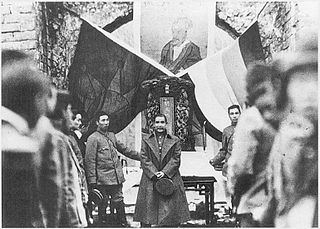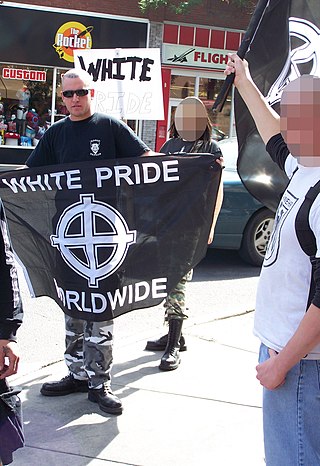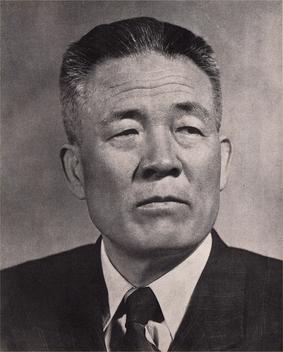Racism is discrimination and prejudice against people based on their race or ethnicity. Racism can be present in social actions, practices, or political systems that support the expression of prejudice or aversion in discriminatory practices. The ideology underlying racist practices often assumes that humans can be subdivided into distinct groups that are different in their social behavior and innate capacities and that can be ranked as inferior or superior. Racist ideology can become manifest in many aspects of social life. Associated social actions may include nativism, xenophobia, otherness, segregation, hierarchical ranking, supremacism, and related social phenomena.

Xenophobia is the fear or dislike of anything which is perceived as being foreign or strange. It is an expression which is based on the perception that a conflict exists between an in-group and an out-group and it may manifest itself in suspicion of one group's activities by members of the other group, a desire to eliminate the presence of the group which is the target of suspicion, and fear of losing a national, ethnic, or racial identity.

Han nationalism is a form of ethnic nationalism asserting ethnically Han people as the exclusive constituents of the Chinese nation. It is often in dialogue with other conceptions of Chinese nationalism, often mutually-exclusive or otherwise contradictory ones. Han people are the dominant ethnic group in both states claiming to represent the Chinese nation: the Republic of China and the People's Republic of China.

White pride and white power are expressions primarily used by white separatist, white nationalist, fascist, neo-Nazi, and white supremacist organizations in order to signal racist or racialist viewpoints. It is also a slogan used by the prominent post-Ku Klux Klan group Stormfront and a term used to make racist/racialist viewpoints more palatable to the general public who may associate historical abuses with the terms white nationalist, neo-Nazi, and white supremacist.
Racism in Russia mainly appears in the form of negative attitudes towards non-ethnic Russian citizens, immigrants or tourists and negative actions against them by some Russians. Traditionally, Russian racism includes antisemitism and Tatarophobia, as well as hostility towards the various peoples of the Caucasus, Central Asia, East Asia and Africa.
Covert racism is a form of racial discrimination that is disguised and subtle, rather than public or obvious. Concealed in the fabric of society, covert racism discriminates against individuals through often evasive or seemingly passive methods. Covert, racially biased decisions are often hidden or rationalized with an explanation that society is more willing to accept. These racial biases cause a variety of problems that work to empower the suppressors while diminishing the rights and powers of the oppressed. Covert racism often works subliminally, and much of the discrimination is done subconsciously.
Brian Reynolds Myers, usually cited as B. R. Myers, is an American professor of international studies at Dongseo University in Busan, South Korea, best known for his writings on North Korean propaganda. He is a contributing editor for The Atlantic and an opinion columnist for The New York Times and The Wall Street Journal. Myers is the author of Han Sǒrya and North Korean Literature, A Reader's Manifesto, The Cleanest Race, and North Korea's Juche Myth.
Racism in Asia is multi-faceted and has roots in events that have happened from centuries ago to the present. Racism in Asia may occur from nation against nation, or within each nation's ethnic groups, or from region against region.
Racial nationalism is an ideology that advocates a racial definition of national identity. Racial nationalism seeks to preserve "racial purity" of a nation through policies such as banning race mixing and the immigration of other races. In order to create a justification for such policies, racial nationalism often promotes eugenics, and advocates political and legislative solutions based on eugenic and other racial theories.
Racism in China arises from Chinese history, nationalism, sinicization, and other factors. Racism in the People's Republic of China has been documented in numerous situations. Ethnic tensions have led to numerous incidents in the country such as the Xinjiang conflict, the ongoing internment and state persecution of Uyghurs and other ethnic minorities, the 2010 Tibetan language protest, the 2020 Inner Mongolia protests, discrimination against Africans in particular and discrimination against Black people in general.
Stereotypes of European Americans in the United States are misleading generalizations about the character, behavior, or appearance of white Americans by other Americans in the United States. For stereotypes about Americans by people of other nationalities, see Stereotypes of Americans.
Anti-Korean sentiment or Koryophobia describes negative feelings towards Korean people, Korean culture, or the countries of North Korea or South Korea.
Racist rhetoric is distributed through computer-mediated means and includes some or all of the following characteristics: ideas of racial uniqueness, racist attitudes towards specific social categories, racist stereotypes, hate-speech, nationalism and common destiny, racial supremacy, superiority and separation, conceptions of racial otherness, and anti-establishment world-view. Racism online can have the same effects as offensive remarks made face-to-face.
In the Arab world, racism targets non-Arabs and the expat majority of the Arab states of the Persian Gulf coming from South Asian groups as well as Black, European, and Asian groups that are Muslim; non-Arab ethnic minorities such as Armenians, Africans, the Saqaliba, Southeast Asians, Jews, Kurds, and Coptic Christians, Assyrians, Persians, Turks, and other Turkic peoples, and South Asians living in Arab countries of the Middle East.
Racism in South Korea comprises negative attitudes and views on race or ethnicity which are related to each other, are held by various people and groups in South Korea, and have been reflected in discriminatory laws, practices and actions at various times in the history of South Korea against racial or ethnic groups. It has been recognized as a widespread social problem in the country. South Korea lacks an anti-discrimination law, which was recommended by the UN Human Rights Committee in 2015. The law has been reported stalled due to "lack of public consensus".

The Cleanest Race: How North Koreans See Themselves and Why it Matters is a 2010 book by Brian Reynolds Myers. Based on a study of the propaganda produced in North Korea for internal consumption, Myers argues that the guiding ideology of North Korea is a race-based far-right nationalism derived from Japanese fascism, rather than any form of communism. The book is based on author's study of the material in the Information Center on North Korea.

Racism has a long history in the United Kingdom and includes structural discrimination and hostile attitudes against various ethnic minorities. The extent and the targets of racism in the United Kingdom have varied over time. It has resulted in cases of discrimination, riots and racially motivated murders.

Cultural racism, sometimes called neo-racism, new racism, postmodern racism, or differentialist racism, is a concept that has been applied to prejudices and discrimination based on cultural differences between ethnic or racial groups. This includes the idea that some cultures are superior to others or in more extreme cases that various cultures are fundamentally incompatible and should not co-exist in the same society or state. In this it differs from biological or scientific racism, which refers to prejudices and discrimination rooted in perceived biological differences between ethnic or racial groups.

Han Sorya was a Korean writer, literary administrator and politician who spent much of his career in North Korea. Regarded as one of the most important fiction writers in North Korean history, Han also served as head of the Korean Writers' Union and Ministry of Education.
Ashley E. Jardina is an associate professor of Political Science at George Mason University and author.







